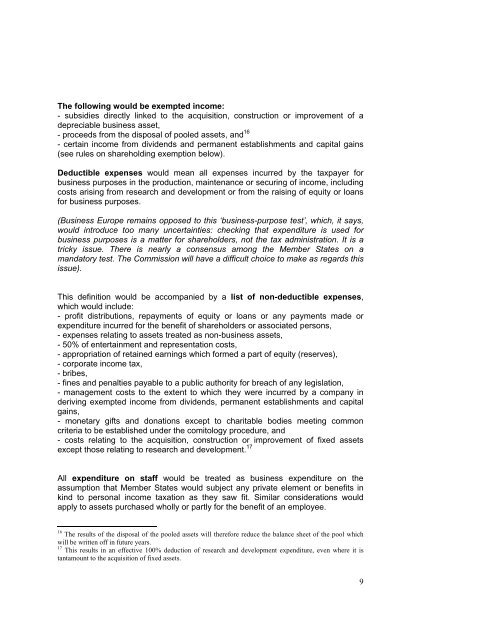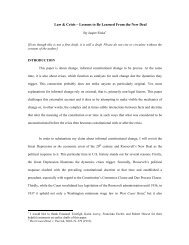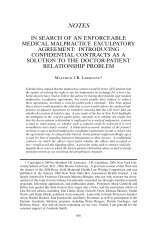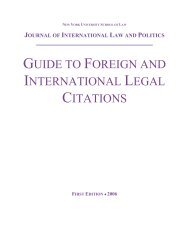An outline of the CCCTB (Common Consolidated Corporate Tax ...
An outline of the CCCTB (Common Consolidated Corporate Tax ...
An outline of the CCCTB (Common Consolidated Corporate Tax ...
You also want an ePaper? Increase the reach of your titles
YUMPU automatically turns print PDFs into web optimized ePapers that Google loves.
The following would be exempted income:<br />
- subsidies directly linked to <strong>the</strong> acquisition, construction or improvement <strong>of</strong> a<br />
depreciable business asset,<br />
- proceeds from <strong>the</strong> disposal <strong>of</strong> pooled assets, and 16<br />
- certain income from dividends and permanent establishments and capital gains<br />
(see rules on shareholding exemption below).<br />
Deductible expenses would mean all expenses incurred by <strong>the</strong> taxpayer for<br />
business purposes in <strong>the</strong> production, maintenance or securing <strong>of</strong> income, including<br />
costs arising from research and development or from <strong>the</strong> raising <strong>of</strong> equity or loans<br />
for business purposes.<br />
(Business Europe remains opposed to this ‘business-purpose test’, which, it says,<br />
would introduce too many uncertainties: checking that expenditure is used for<br />
business purposes is a matter for shareholders, not <strong>the</strong> tax administration. It is a<br />
tricky issue. There is nearly a consensus among <strong>the</strong> Member States on a<br />
mandatory test. The Commission will have a difficult choice to make as regards this<br />
issue).<br />
This definition would be accompanied by a list <strong>of</strong> non-deductible expenses,<br />
which would include:<br />
- pr<strong>of</strong>it distributions, repayments <strong>of</strong> equity or loans or any payments made or<br />
expenditure incurred for <strong>the</strong> benefit <strong>of</strong> shareholders or associated persons,<br />
- expenses relating to assets treated as non-business assets,<br />
- 50% <strong>of</strong> entertainment and representation costs,<br />
- appropriation <strong>of</strong> retained earnings which formed a part <strong>of</strong> equity (reserves),<br />
- corporate income tax,<br />
- bribes,<br />
- fines and penalties payable to a public authority for breach <strong>of</strong> any legislation,<br />
- management costs to <strong>the</strong> extent to which <strong>the</strong>y were incurred by a company in<br />
deriving exempted income from dividends, permanent establishments and capital<br />
gains,<br />
- monetary gifts and donations except to charitable bodies meeting common<br />
criteria to be established under <strong>the</strong> comitology procedure, and<br />
- costs relating to <strong>the</strong> acquisition, construction or improvement <strong>of</strong> fixed assets<br />
except those relating to research and development. 17<br />
All expenditure on staff would be treated as business expenditure on <strong>the</strong><br />
assumption that Member States would subject any private element or benefits in<br />
kind to personal income taxation as <strong>the</strong>y saw fit. Similar considerations would<br />
apply to assets purchased wholly or partly for <strong>the</strong> benefit <strong>of</strong> an employee.<br />
16<br />
The results <strong>of</strong> <strong>the</strong> disposal <strong>of</strong> <strong>the</strong> pooled assets will <strong>the</strong>refore reduce <strong>the</strong> balance sheet <strong>of</strong> <strong>the</strong> pool which<br />
will be written <strong>of</strong>f in future years.<br />
17<br />
This results in an effective 100% deduction <strong>of</strong> research and development expenditure, even where it is<br />
tantamount to <strong>the</strong> acquisition <strong>of</strong> fixed assets.<br />
9
















